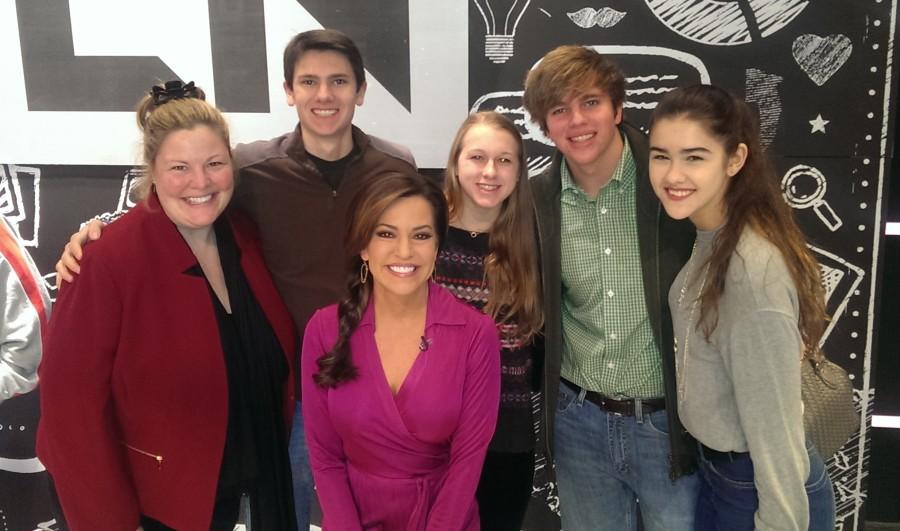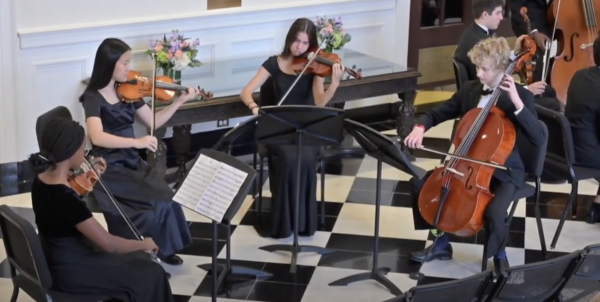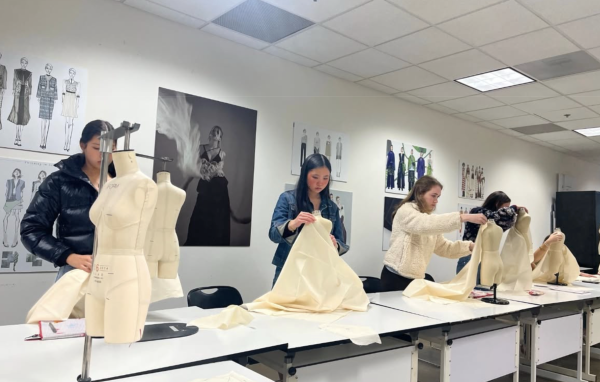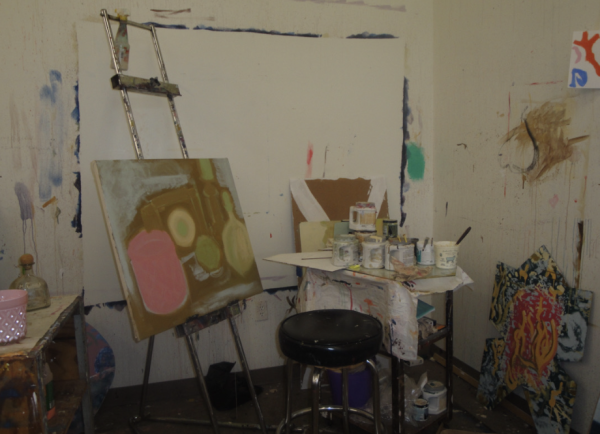JanTerms explore Atlanta arts industry
With Georgia rapidly reaching the forefront of arts and film production due to new tax benefits, many students opted for JanTerms that focused on music and the performing arts. Either by immersing themselves in Atlanta’s art scen or by staying on campus to produce their own work, teachers and students alike saw JanTerm as a way to explore their artistic passions during the school day.
Among the more art-focused JanTerms, the “Behind the Scenes: Theater, Film, and TV in Atlanta” class is unique. Students in the course studied all of the possible careers in the burgeoning entertainment scene in Atlanta rather than the production of the media itself.
“The idea was to open up the minds of the students to careers they could have in the entertainment industry in Atlanta,” said co-teacher Kate Morgens. “We met Steve Smith, a sportscaster, and he introduced us at Turner Studio to a producer, tour guide, security manager, and talked to us about all kinds of professions from makeup artists to research directors to technical designers.”
The class itself was more field trip-based, with frequent visits to media stations in Atlanta such as the CNN Center, Turner Stadium, and NPR.
“Our teachers love that there’s not really a structure,” said freshman Alexa Tomaras. “We get to go on all the field trips that Mrs. Morgens said she’s always wanted to go on.”
While trips were highlights, guest speakers were also instrumental in connecting with the students.
“My favorite thing is having alumni in to talk,” said Morgens. “It helps the students realize that people who were sitting in their seats were able to get these jobs.”
(continued from p. 1)
“Music and the Movies,” another JanTerm class that focused on the entertainment industry, actually traveled to Hollywood, California, instead of staying in Atlanta. The course was designed to give students an overview of the use of soundtracks in everything from silent movies to modern cinema, and thus focused on introducing students to key films, key vocabulary, and prominent composers in the industry.
“One of my favorite activities is film strip analysis, in which we take a short clip of film… and the students have to think about what is happening in the film, what is happening with the music, what instruments are being used, and what the composer is trying to do with the music to help move the scene along,” said co-teacher Ellen Vesey. “It’s almost like critical reading with the soundtrack. It’s teaching the kids to think deeper about movies.”
This type of analysis was not only fun but also necessary to prime the students for their experience in California. The trip was a busy one, filled with meetings with everyone on the spectrum from composers to sound editors to producers to conductors.
“[The students] were able to meet with Oscar winning composers and sound editors, ask them questions, learn how they established themselves in the business,” said Vesey. “We also met with a young, up-and-coming composer who told us how hard it is to get into the business.”
Vesey expressed sentiments similar to many other teachers’ on the topic of collaboration; as a math teacher, she was not an expert in the field of movie soundtracks.
“I didn’t have a whole lot of background in this course. I was definitely learning along with the kids as I was teaching, which made the class fun for me as well,” said Vesey. “The course lent itself to interaction and analysis more than the typical math class would. Math concepts are concrete; there are usually only one or two ways to approach a problem, but there is no concrete answer to how you interpret a piece.”
One of the most project-driven of these courses was “Songwriting and Music Production,” which had only one field trip, and instead focused on allowing students to hone their skills in producing a variety of music.
“Our JanTerm was conceived as a way to help kids who wanted to write songs, lyrics, music, or even make practice tracks of their own,” said Jack Morgan, “Songwriting and Music Production” co- teacher. “It was just a way for these kids to explore the Garage Band software and make projects such as film scores and original songs with it.”
This JanTerm was an example of one in which the teachers learned alongside their students.
“I’m not an expert when it comes to songwriting, music production, [and] use of the program. I am probably not nearly as sophisticated or musically talented as anybody in the class,” said Morgan. “A lot of the class involved me learning it along with everyone else. My colleague, Ken Simpson, is truly an expert at music. He is an accomplished jazz pianist, band director and percussionist, and started musical production classes in Georgia.”
While teachers enjoyed the collaborative aspect of JanTerm, students flourished in the risk-taking environment, as JanTerm classes tended to allow more personal expression and reduce emphasis on facts and memorization.
“Regular classes don’t allow much, if any freedom. JanTerm was rigorous in a way that you had to exercise your creativity and ear, but wasn’t too stressing because I knew if I messed up, I still had a whole ton of wiggle room,” said junior Beth Huang, a member of Morgan’s course. “It was interesting to see that since everyone in our class was interested in music, even during the community times, many of us still played music and explored Garage Band.”
While the “Songwriting and Music Production” JanTerm class focused on individual music composition, others, such as the “From Zumba to Hip Hop” class, emphasized further individual forms of expression.
“This class is about contemporary modes of expression, but we really focus on rhetoric and the evolvement of the canon and transformation into alternative rhetoric,” said co-teacher Jennifer Dracos-Tice. “Alternative rhetoric are modes of expression coming out of the canon, but are also in a lot of ways pushing against the canon and fusing into different expression moves. For example, I taught the culture and poetics of hip-hop and rap, which is coming out of not only an oral poetry tradition but also many other forms of expression.”
Within the umbrella of alternative rhetoric, the class specifically focused on forms such as hip-hop, zumba, flamenco, and spoken word poetry.
“I chose this class mainly for the spoken word aspect,” said junior Robbie Chambliss. “We had a nationally ranked spoken word poet, and a great poetry slam in Decatur [at Java Monkey]. I had a lot of fun with it.”
Dance also took center stage in the course, and co-teacher Estefania Olid especially highlighted the flamenco.
“I taught flamenco, which began as a marginalized phenomenon and that was itself alternative, and then transformed into a globalized dance. Now the way it has become alternative is in many groups it is being done differently, not following the canon,” said Olid. “Now there is flamenco fusion, when they do flamenco and they mix it up with pop and electronic music.”
Throughout the month, students delved deep into the literature behind each alternative form of expression and were then forced out of their comfort zones to perform a variety of rhetorics. Towards the end of January, however, students picked a specific form to execute for their final projects. Some chose to dance individually or to perform dance battles.
“What’s wonderful about the course is that it’s not just experimental,” said Dracos Tice. “It was always contextualized and there is a historical perspective behind our activities and projects.”
The “Shakespeare and Music” JanTerm also had a basis in history, as students studied opera versions of Shakespearean plays such as A Midsummer Night’s Dream and Macbeth and the relevance of the musical additions to the original works.
“It’s really interesting to see that what you can act out on a stage can be translated into music,” said sophomore Rachel Drury. “You can get the character or the storyline just by the soundtrack… it just fits.”
The majority of students who took the class were passionate about both Shakespeare and music and often transformed simple questions into lengthy discussions and projects.
“I’m kind of a nerd for the opera and Shakespeare,” said Drury. “I have never been able to study opera and then a play and compare the two, so seeing what different directors chose to do with Macbeth versus other directors was very interesting.”
The “Shakespeare and Music” teachers were thrilled to have such a concentrated group of students from all grade levels who were deeply interested in the same topics.
“I’m always impressed with Westminster,” said co-teacher Maggie Bailey, “but even more so in the last few weeks. All of my students immediately bought in to the class…it was really great to see people with a great ear of music and a great ear for poetry get passionate about [things] that were supposed to be quick activities.”
Bailey used the students’ passion to her advantage, utilizing the extra time allocated for JanTerm to inspire in-depth conversations. Like Morgan, she also felt that her co-teacher’s knowledge enriched the class.
“I think with JanTerm there’s time to ask questions that take longer to really get into, and we get to spend a couple of hours to look at one thing,” explained Bailey. “For example, we watched three different versions of the same scene in A Midsummers Night’s Dream, which allowed us to go a little bit deeper. I also got to teach with someone else, which brought in this whole other area of expertise, as I don’t really know anything about opera. All of a sudden all I know is made more interesting and deeper with the help of Mr. Scott.”
Art JanTerms enabled students to take part in this sort of interpretation as well as to experience ideas and concepts through projects and field trips.
“It really made sense [in Hollywood], everything really clicked,” said freshman Lauren Brown, a student in the “Music and the Movies” course. “You can learn about things in a textbook, but when you actually see it, it makes that much more sense.”
Furthermore, the freedom for self-expression and exploration characteristic in art-focused courses was evident throughout Westminster as the month progressed.
“The whole air of campus has been wonderful…” said Morgan, “the whole spirit of it, of ‘let’s do something we haven’t done’ that we couldn’t do in a normal way. I love it; it’s how the creative process works.”




